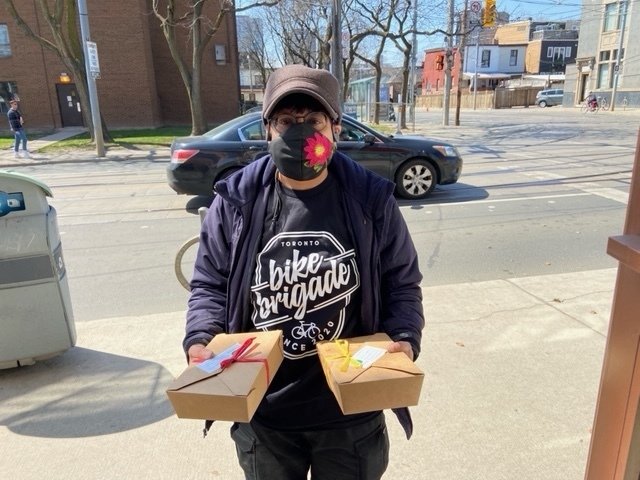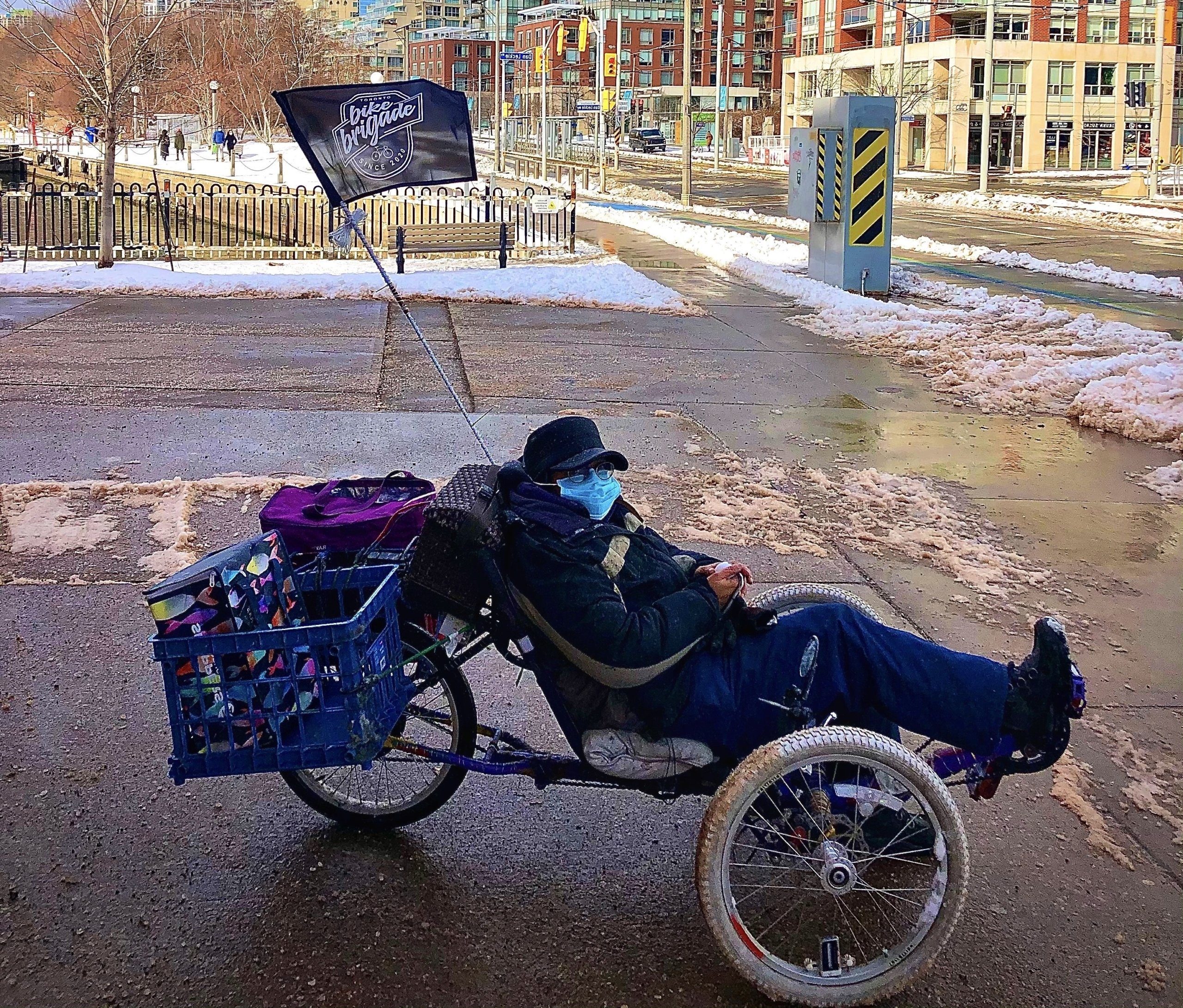 635
635  6 mins
6 mins Delivery bikers are a familiar sight across the world.
In Toronto, they’re doing deliveries for free… helping dozens of community organizations deliver food and other essential supplies to vulnerable and isolated communities across the city.
Shahnaz Stri is a middle-aged biker living in Toronto, Canada. She rides for the Bike Brigade, a group of cyclists making deliveries across the city.
Nothing unusual so far.
But the Bike Brigade is no ordinary delivery service. Volunteers staff it.
For Shahnaz, volunteering with The Bike Brigade is more than just lending a helping hand.
We recently spoke with Shahnaz and Rachel Wang, Executive Director of The Bike Brigade, to learn more about a movement that is mobilizing people on bikes to support Toronto’s communities.
A volunteer’s story

Shahnaz Stri (Photo courtesy Shahnaz Stri)
To this day, Shahnaz does not know her exact age.
In her native country, India, she was found at a train station, abandoned around the age of 3 or 4. She was clearly ill and brought to a hospital where the staff could not diagnose an underlying medical condition.
Assuming Shahnaz suffered from some form of cancer, the medical team decided she was fated to an early death.
Salvation came in the form of a trainee doctor doing rounds.
He spotted Shahnaz’s rare condition and had her transferred to a children’s hospital for the appropriate treatment.
Then, three years later, the doctor successfully arranged for Shahnaz’s adoption in Toronto.
A not so ‘fresh start.’
Life in Canada was not all smooth sailing.
She was aged between 7 and 10 when she arrived.
Small in stature, her school arbitrarily decided she was born in 1970. Shahnaz knew this was impossible. That was the year she was found at the station.
Nonetheless, the school insisted on putting Shahnaz in a class of 6 year-olds.
Furthermore, her adopted mum wanted to change her name, but Shahnaz was adamant about hanging on to that at the very least.
Homelife was tough too.
So much so that when she was between 13 and 16, Shahnaz’s adoptive family wanted to send her back to India.
Shahnaz admits to being an angry teenager. Given her journey, this was understandable but not what her adoptive family expected.
Shahnaz spent the next seven years in the child welfare system.
She was shunted between a succession of foster and group homes. Shahnaz eventually refused to return to foster homes, disillusioned with foster parents who “pretended to love her.”
In the meantime, Shahnaz’s health continued to be precarious. She estimates having undergone 40 to 50 surgeries as a child and a further 30 as a young adult.

Shahnaz on a delivery (Photo by caterTO courtesy of Shahnaz Stri)
Having faced such challenges, one could easily understand Shahnaz wanting to kick back and take it easy when she could.
But she has always enjoyed helping others.
Shahnaz first started volunteering around the age of 13 while in the Children’s Aid Society, tutoring other kids with disabilities.
Later, at the University of Toronto, she volunteered at the Women’s Center, where she became a coordinator and started a food bank which she is still running today.
Exposure to these volunteer activities nourished her dedication to social justice and made her even more passionate about community involvement.
View this post on Instagram
Being of service
Then, for a period of 10 to 15 years, Shahnaz stopped volunteering.
Continued poor health had been leading to another form of suffering: ableism.
The organizations where Shahnaz volunteered told her – more or less directly – that she was unreliable. Shahnaz found this unfair; she could hardly be in the hospital and active in the community simultaneously.
The feeling of being misunderstood led to frustration and guilt, negatives she decided she could do without.
So Shahnaz stopped volunteer work.
However, when the pandemic hit in 2020, Shahnaz wanted to “get back out there”.
Although she had been healthier for a while, her doctors warned strongly against going out in the pandemic.
Shahnaz felt like her mental health would seriously deteriorate without being able to get out and help others during this unprecedented time of need.
Shahnaz went back to the doctors – she had always enjoyed riding her trike and asked if that would be safe?
The doctors agreed!
Shahnaz was free to ride but wanted to ride with a purpose.
Initially, she spoke with volunteers from the People’s Pantry. The People’s Pantry is another grassroots initiative providing home-cooked meals and grocery bundles to those in need.
During that discussion, the people at the Pantry spoke to Shahnaz about the Bike Brigade.
View this post on Instagram
The Bike Brigade
“The Bike Brigade was founded in 2020 by Dave Shellnut, a lawyer prioritizing the rights of injured cyclists and vulnerable people,” explained Rachel Wang. “The initiative sprung up at the beginning of the Covid-19 pandemic. The pandemic only highlighted some of the systemic challenges that local political regimes have failed to address. One of these challenges is food insecurity.”
View this post on Instagram
“Food insecurity,” Rachel continues, “is the lack of physical and economic access to sustainable amounts of good food – food that is safe, nutritious, and culturally relevant.”
Food insecurity impacts 20% of households in Toronto but varies, in relation to other indicators like race.”
Rachel is a community organizer, and she joined The Bike Brigade in the fall of last year.
Titles are not worn like badges at the Brigade. As Executive Director, Rachel is basically in charge of ‘getting things done.’
“Among other things, this means pairing 1,400 volunteers with community organizations that provide essential supplies to people in need across Toronto,” says Rachel.
The riders offer free delivery of critical necessities that people cannot pick up in person.
The packages contain hot meals, food essentials, Personal Protective Equipment, menstrual and hygiene products, and therapy supplies to the communities they serve.
View this post on Instagram
The Bike Brigade in action
The Brigade is coordinating an impressive number of partner organizations to prepare packages of necessities for delivery.
Then, they post a delivery request on the Brigade’s website. The website centralizes all the delivery opportunities that are available to Brigade riders.
At that point, a volunteer biker can claim responsibility for the delivery, picking up the package and delivering it to its destination.
Volunteers decide how much time to give, how far they want to bike, how much they can carry, and what type of goods they can carry.
Setting up and running a volunteer logistics service is challenging. Besides managing partner relationships, The Brigade also manages volunteer intake and rider coordination, serving vulnerable people, safety, delivery logistics…
Information technology is critical.
So the Brigade built a new dispatch application from scratch.
The app is intelligent. It optimizes routes and can dispatch 60 to 80 riders to deliver up to 150 boxes in a 3-hour window.
Deliveries are assigned via text.
And it allows a Rapid Response Team to handle last-minute orders as they come in.
View this post on Instagram
Rachel also emphasized the importance of building trust with the partners who use the Brigade to deliver their goods. “It is essential to centre these communities to ensure our supports are tailored to their needs and requests.”.
It’s all part of building a “mutual aid” mindset.
Beyond the pandemic
Shahnaz is happy to continue riding for the Bike Brigade, adding, “At least as long as my health and trike battery holds out!”
Actually, the battery for her e-trike was stolen in October 2020. As a result, Shahnaz crowdfunded a new battery and then donated the excess funds to the Brigade.
“One of the biggest challenges for me has been the cold, especially for the hands,” says Shahnaz.
The cold was initially a showstopper for her – the wind chill can easily reach -20°C. Eventually, Shahnaz became more confident about venturing out in winter.
And with the e-assist on her trike, Shahnaz says, “I can do between 3 or 4 deliveries per day, and I’m covering up to 30km.”
View this post on Instagram
For Shahnaz, biking is about both mental and physical health.
And thanks to her volunteering for the Bike Brigade, it’s also about having a purposeful goal.
She posts her rides on Strava and hopes to inspire others to get the kilometers in whilst contributing to the community.
So keep an eye out for Shahnaz on her trike and the other Bike Brigade riders who are out there, rain or shine, zigzagging over the streets of Toronto.

Shahnaz Stri (Photo by Laela O’Kelly courtesy of Shahnaz Stri)
Editor’s note
Similar initiatives are sprouting up across the globe – “Serve the City Bike Brigade” in Paris, “The Budapest Bike Mafia”, “Cambridge Bicycle Safety” in the UK, “Relief Riders” in several major cities in India to mention just a few.
Please tell us if you know about other similar initiatives; we’d love to know.
They are building community, creating connections, providing critical services, and helping to reduce emissions.
By some estimates, The Bike Brigade’s activity has reduced greenhouse gases by over seventeen tons.
Feature image: Juan Rojas/Unsplash
To know more about Bike Brigade
Learn how The Bike Brigade and its partners are delivering everything from food to art therapy supplies.
Also look for them on Instagram, Twitter, Linkedin and Facebook.
And remember to follow Shahnaz on Strava Shahnaz Stri, Toronto, ON, Canada, ‘Ride a TerraTrike Path’
You may also like reading about Kimiko Hirata “The woman who stood up to coal power – and won.”


 Bow Seat - Fiona Luo 2017
Bow Seat - Fiona Luo 2017 https://unsplash.com/photos/agmOZV67npw
https://unsplash.com/photos/agmOZV67npw